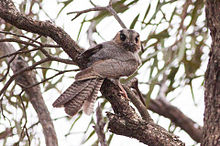| Apodimorphae | |
|---|---|

| |
| Australian owlet-nightjar, Aegotheles cristatus | |

| |
| Common swift, Apus apus | |
| Scientific classification | |
| Domain: | Eukaryota |
| Kingdom: | Animalia |
| Phylum: | Chordata |
| Class: | Aves |
| Clade: | Strisores |
| Clade: | Vanescaves |
| Clade: | Apodimorphae Sibley et al., 1988 |
| Subtaxa | |
| |
Apodimorphae is a clade of strisorean birds that include the extant families Trochilidae (hummingbirds), Hemiprocnidae (treeswifts), Apodidae (swifts), Aegothelidae (owlet-nightjars), and many fossil families. This grouping of birds has been supported in a variety of recent studies.[1][2][3][4][5][6] There are two higher classification schemes that have been proposed for the apodimorph families. One is all strisorean birds are classified in the order Caprimulgiformes,[3][5] while the other is the strisorean birds are split into several distinct orders. In this case Apodimorphae is a subclade of Strisores that includes the orders Aegotheliformes (only including the owlet-nightjars of Australasia) and the Apodiformes (the swifts, treeswifts, and hummingbirds which have a global distribution).[2][4][6]
The name Daedalornithes[1] is also been used for the owlet-night-apodiform clade. Daedalornithes and Apodimorphae have different definitions. Daedalornithes is defined as the crown group (the least inclusive clade including Aegotheles cristatus and Apus apus)[6] whereas Apodimorphae referring the total-group (the most inclusive clade including Aegotheles cristatus and Apus apus but not Caprimulgus europaeus, Steatornis caripensis, Nyctibius grandis, or Podargus strigoides, a definition that includes fossil lineages more closely related to Daedalornithes than they are to other Strisores)
- ^ a b Sangster, George (2005). "A name for the clade formed by owlet-nightjars, swifts and hummingbirds (Aves)". Zootaxa. 799 (1): 1–6. CiteSeerX 10.1.1.193.2189. doi:10.11646/zootaxa.799.1.1.
- ^ a b Cracraft, Joel (2013), "Avian higher-level relationships and classification: Nonpasseriforms", in Dickinson, Edward C.; Van Remsen, James Jr. (eds.), Non-passerines, The Howard and Moore Complete Checklist of the Birds of the World, vol. 1 (4th ed.), Eastbourne, UK: Aves Press, pp. xxi–xliii, ISBN 9780956861108
- ^ a b Jarvis, Erich D.; et al. (2014). "Whole-genome analyses resolve early branches in the tree of life of modern birds". Science. 346 (6215): 1320–1331. Bibcode:2014Sci...346.1320J. doi:10.1126/science.1253451. PMC 4405904. PMID 25504713.
- ^ a b Prum, Richard O.; Berv, Jacob S.; Dornberg, Alex; Field, Daniel J.; Townsend, Jeffrey P.; Lemmon, Emily Moriarty; Lemmon, Alan R. (2015). "A comprehensive phylogeny of birds (Aves) using targeted next-generation DNA sequencing". Nature. 526 (7574): 569–573. Bibcode:2015Natur.526..569P. doi:10.1038/nature15697. PMID 26444237. S2CID 205246158.
- ^ a b Reddy, Sushma; et al. (2015). "Why do phylogenomic data sets yield conflicting trees? Data type influences the avian tree of life more than taxon sampling". Systematic Biology. 66 (5): 857–879. doi:10.1093/sysbio/syx041. PMID 28369655.
- ^ a b c Chen, Albert; White, Noor D.; Benson, Roger B. J.; Braun, Michael J.; Field, Daniel J. (2019). "Total-evidence framework reveals complex morphological evolution in nightbirds (Strisores)" (PDF). Diversity. 11 (9): 143. doi:10.3390/d11090143.
